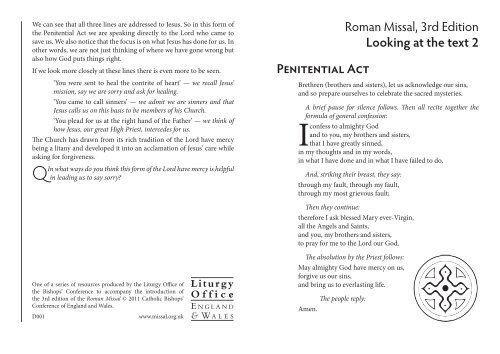Roman Missal, 3rd Edition Looking at the text 2 Penitential Act
Roman Missal, 3rd Edition Looking at the text 2 Penitential Act
Roman Missal, 3rd Edition Looking at the text 2 Penitential Act
Create successful ePaper yourself
Turn your PDF publications into a flip-book with our unique Google optimized e-Paper software.
We can see th<strong>at</strong> all three lines are addressed to Jesus. So in this form of<br />
<strong>the</strong> <strong>Penitential</strong> <strong>Act</strong> we are speaking directly to <strong>the</strong> Lord who came to<br />
save us. We also notice th<strong>at</strong> <strong>the</strong> focus is on wh<strong>at</strong> Jesus has done for us. In<br />
o<strong>the</strong>r words, we are not just thinking of where we have gone wrong but<br />
also how God puts things right.<br />
If we look more closely <strong>at</strong> <strong>the</strong>se lines <strong>the</strong>re is even more to be seen.<br />
‘You were sent to heal <strong>the</strong> contrite of heart’ — we recall Jesus’<br />
mission, say we are sorry and ask for healing.<br />
‘You came to call sinners’ — we admit we are sinners and th<strong>at</strong><br />
Jesus calls us on this basis to be members of his Church.<br />
‘You plead for us <strong>at</strong> <strong>the</strong> right hand of <strong>the</strong> F<strong>at</strong>her’ — we think of<br />
how Jesus, our gre<strong>at</strong> High Priest, intercedes for us.<br />
The Church has drawn from its rich tradition of <strong>the</strong> Lord have mercy<br />
being a litany and developed it into an acclam<strong>at</strong>ion of Jesus’ care while<br />
asking for forgiveness.<br />
QIn wh<strong>at</strong> ways do you think this form of <strong>the</strong> Lord have mercy is helpful<br />
in leading us to say sorry?<br />
<strong>Penitential</strong> <strong>Act</strong><br />
<strong>Roman</strong> <strong>Missal</strong>, <strong>3rd</strong> <strong>Edition</strong><br />
<strong>Looking</strong> <strong>at</strong> <strong>the</strong> <strong>text</strong> 2<br />
Brethren (bro<strong>the</strong>rs and sisters), let us acknowledge our sins,<br />
and so prepare ourselves to celebr<strong>at</strong>e <strong>the</strong> sacred mysteries.<br />
A brief pause for silence follows. Then all recite toge<strong>the</strong>r <strong>the</strong><br />
formula of general confession:<br />
I<br />
confess to almighty God<br />
and to you, my bro<strong>the</strong>rs and sisters,<br />
th<strong>at</strong> I have gre<strong>at</strong>ly sinned,<br />
in my thoughts and in my words,<br />
in wh<strong>at</strong> I have done and in wh<strong>at</strong> I have failed to do,<br />
And, striking <strong>the</strong>ir breast, <strong>the</strong>y say:<br />
through my fault, through my fault,<br />
through my most grievous fault;<br />
One of a series of resources produced by <strong>the</strong> Liturgy Office of<br />
<strong>the</strong> Bishops’ Conference to accompany <strong>the</strong> introduction of<br />
<strong>the</strong> <strong>3rd</strong> edition of <strong>the</strong> <strong>Roman</strong> <strong>Missal</strong> © 2011 C<strong>at</strong>holic Bishops’<br />
Conference of England and Wales.<br />
D001 www.missal.org.uk<br />
Liturgy<br />
O f f i c e<br />
E N G L A N D<br />
& W A L E S<br />
Then <strong>the</strong>y continue:<br />
<strong>the</strong>refore I ask blessed Mary ever-Virgin,<br />
all <strong>the</strong> Angels and Saints,<br />
and you, my bro<strong>the</strong>rs and sisters,<br />
to pray for me to <strong>the</strong> Lord our God.<br />
The absolution by <strong>the</strong> Priest follows:<br />
May almighty God have mercy on us,<br />
forgive us our sins,<br />
and bring us to everlasting life.<br />
Amen.<br />
The people reply:
I Confess<br />
Sticks and stones may break my bones but words cannot hurt <strong>the</strong>m.<br />
This is a saying th<strong>at</strong> we use when someone is unpleasant or critical. We<br />
say it to ourselves or aloud as a kind of self-defence. But is it true? Words<br />
can be very destructive. They can hurt very deeply and can lead o<strong>the</strong>rs<br />
astray. If th<strong>at</strong> is true for words, wh<strong>at</strong> about our thoughts?<br />
There are times when wh<strong>at</strong> and how we think can be wrong. Even our<br />
thoughts can be sinful. They can affect our behaviour in all kinds of<br />
ways. Our <strong>at</strong>titudes can prompt us to put into word or action all kinds<br />
of things we might regret. The ‘I Confess’ or ‘Confiteor’ leads us to<br />
remember this.<br />
It also reminds us th<strong>at</strong> <strong>the</strong>re are such things as sins of omission. To<br />
stand by and do nothing in <strong>the</strong> presence of gre<strong>at</strong> wrong is a sin. If we<br />
ignore <strong>the</strong> desper<strong>at</strong>e pleading and needs of those who are helpless <strong>the</strong>re<br />
is sinfulness in our inaction.<br />
As I say sorry it is important to admit wrongdoing ‘in my thoughts and<br />
in my words, in wh<strong>at</strong> I have done and in wh<strong>at</strong> I have failed to do.’<br />
We say I confess admitting our own personal responsibility and th<strong>at</strong> we<br />
can’t blame it on someone else. As I stop and reflect <strong>at</strong> <strong>the</strong> beginning of<br />
<strong>the</strong> <strong>Penitential</strong> <strong>Act</strong> it is important to confront myself and realise I need<br />
to change.<br />
Also we should think of <strong>the</strong> persons we speak to in this prayer. There<br />
is God who accepts us forgives us. There are Mary, <strong>the</strong> angels and <strong>the</strong><br />
saints whose prayers we need and <strong>the</strong>re is our neighbour. Inviting us to<br />
say this prayer <strong>the</strong> Church reminds us th<strong>at</strong> our sins affect everybody. In<br />
fact, it is often those who are closest to us th<strong>at</strong> we hurt <strong>the</strong> most. As we<br />
say <strong>the</strong> pray we ask th<strong>at</strong> o<strong>the</strong>rs will pray for us and we hope th<strong>at</strong> if we<br />
have hurt <strong>the</strong>m <strong>the</strong>y will forgive us.<br />
At <strong>the</strong> end of <strong>the</strong> prayer <strong>the</strong> priest says ‘<strong>the</strong> absolution’ — May almighty<br />
God have mercy on us, forgive us our sins, and bring us to everlasting<br />
life’. It is traditionally called an absolution. Does this simple absolution<br />
in Mass forgive sins? It does, just as God will forgive us whenever we<br />
make any act of sorrow. But this does not replace <strong>the</strong> Sacrament of<br />
Reconcili<strong>at</strong>ion. Th<strong>at</strong> Sacrament enables us to not only fully express our<br />
sorrow and begin a new life, it is <strong>the</strong> clearest expression of God’s loving<br />
mercy guaranteeing forgiveness for even our most serious lapses.<br />
QIn wh<strong>at</strong> ways do you think <strong>the</strong> ‘I confess’ is helpful in leading us to<br />
say sorry?<br />
Lord, have mercy<br />
The ‘Lord, have mercy’ (Kyrie eleison) is a short prayer th<strong>at</strong> seems to<br />
finish <strong>the</strong> <strong>Penitential</strong> <strong>Act</strong>. Interestingly it began as something quite<br />
different. Nearly fifteen hundred years ago it was part of a Litany used as<br />
Mass began. Everyone would be invited to pray for an intention, ‘Kyrie<br />
eleison’ would be sung, all would repe<strong>at</strong> and <strong>the</strong>y proceeded to <strong>the</strong> next<br />
intention. The litany could be quite long and in a way it was a form of<br />
Bidding Prayer occurring <strong>at</strong> <strong>the</strong> start of Mass.<br />
Things changed and a shortened form survived without <strong>the</strong> petitions but<br />
with just 3 Kyrie eleisons, 3 Christe eleisons and 3 Kyrie eleisons. L<strong>at</strong>er<br />
<strong>the</strong>se three groups of three were seen as being addressed to <strong>the</strong> Trinity. The<br />
Kyrie would only be used as part of a litany in special circumstances and<br />
normally it was used in its simplest form surrounded by o<strong>the</strong>r prayers.<br />
At <strong>the</strong> changes of <strong>the</strong> Second V<strong>at</strong>ican Council it was decided to reintroduce<br />
a Litany with <strong>the</strong> ‘Lord have mercy’ and use it as one of <strong>the</strong> forms of <strong>the</strong><br />
<strong>Penitential</strong> <strong>Act</strong>. Look closely <strong>at</strong> <strong>the</strong> words of this penitential litany:<br />
You were sent to heal <strong>the</strong> contrite of heart.<br />
Lord, have mercy.<br />
You came to call sinners.<br />
Christ, have mercy.<br />
You are se<strong>at</strong>ed <strong>at</strong> <strong>the</strong> right hand of <strong>the</strong><br />
F<strong>at</strong>her to intercede for us.<br />
Lord, have mercy.
















